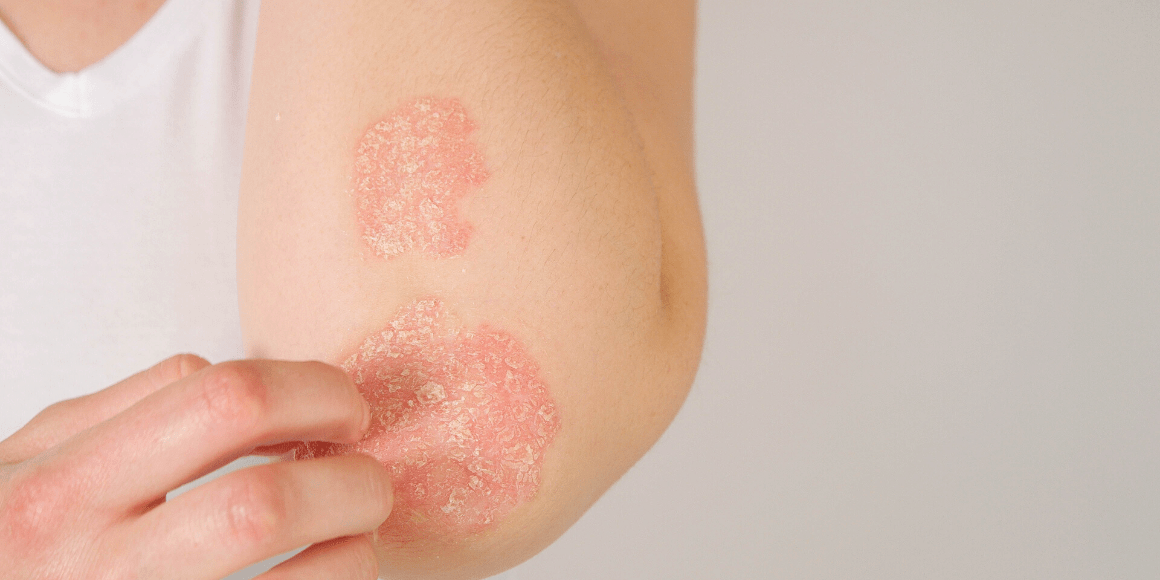
Do red itchy patches of skin appear on your body? Do they make you uncomfortable physically, as well as emotionally? You try hiding the condition from others, and you’re are at a loss as to how to make the occurrences stop.
The first step to healing is knowing which it is: Psoriasis vs. Eczema. For that, you’ll need a formal diagnosis, but see below to learn which condition you’re likely facing and how to get relief.
What is Eczema?
While the term is often used as a type of dermatitis, Eczema is just the formal name for dermatitis. Dermatitis is any inflammation of the skin, so Eczema can appear differently in various people.
It most often causes:
- Redness
- Itchiness
- Rashes
It’s ordinarily local, so for example, someone may have a patch of red, itchy skin:
- Behind/Inside a knee or elbow
- On the neck
- On the forearm, leg, or torso
Some people may experience thinning, raised, or weeping skin if they scratch the affected area. This can lead to permanent skin damage and scarring.
Is Eczema Contagious?
Eczema is not contagious. Instead, it’s a type of allergic reaction. A smaller percentage of people with the atopic kind have a genetic mutation that makes it more likely, but even they can manage it by taking certain precautions.
Generally, the skin is “overreacting” to something in the environment. This could be a plant, clothing, detergent, shampoo, body wash, makeup, animals, type of food (e.g., gluten), and even touching other people. Poor diet and unmanaged stress can increase severity.
The skin may heal from time to time, but once it becomes irritated again, a chain reaction of symptoms occur. Some people who have the condition grow out of it; others don’t develop symptoms until later in life. While the exact cause may vary and be hard to determine, dermatitis is always the result of inflammation, which is an immune response, so cutting down on inflammation in the body can reduce symptoms.
At a glance, Psoriasis vs. Eczema may not be clear, so next, we’ll explore how psoriasis is different.
What Is Psoriasis?
Psoriasis is similar to eczema in that it causes itchy, red patches, but those spots may also be silvery scales. They often appear on the:
- Scalp
- Knees
- Palms
- Feet
Depending on the type of psoriasis, the skin may thicken and harden, form pustules, or develop at creases like those in the armpits or groin.
While eczema is undoubtedly a disruption of the immune system, psoriasis is usually more severe. The immune system is not only causing an inflammatory response; it’s also taking more extreme measures to protect the body from the environment that it perceives as hostile.
As a result, it instructs the skin to increase the rate of cell turnover, which may sound like a good thing cosmetically-speaking. But skin cells typically take months to form deep in the dermis and then move to the surface. With psoriasis, they take days, so like any rushed production line, you end up with poorly formed cells. This changes how the skin looks and feels. Some people with psoriasis develop a secondary condition called psoriatic arthritis, a painful joint inflammation.
Psoriasis is often misdiagnosed because it looks like eczema, especially early on. Some people will have the condition for several years; then, it’s gone. Others have it their whole lives.
What causes Psoriasis?
While psoriasis is genetic, flare-ups are generally triggered by things like:
- Stress
- Certain medications
- Cold, dry weather
- Infection
There is some evidence that those who are overweight may experience worsened symptoms, and a poor diet can be a factor.
Psoriasis vs. Eczema: how are they treated?
Both conditions can be managed by:
- Avoiding triggers
- Losing some weight, if needed
- Better managing stress
- Improving the diet
A Mediterranean-style diet rich in a variety of whole foods, including those containing ample Omega 3 (e.g., fish, olive oil, chia), may reduce how easily an episode is triggered.
Additionally, doctors may prescribe immunosuppressants for psoriasis and steroid creams for eczema, while prescription anti-inflammatory topicals and light therapy can help both conditions.
Aesthetic treatments
The primary goal of treatment is to relieve the symptoms since neither condition can be fully cured. Still, some people find that once they’ve learned to manage their condition effectively, they’re left with scars and discoloration. If your situation is now well-managed, you might consider aesthetically treating the damaged areas.
When considering an aesthetic procedure, obviously, it’s vital to work with a doctor who is aware of the sensitive nature of your skin condition and can recommend procedures that will not trigger an episode. This may involve testing a small area before treatment.
Our Board-Certified Plastic Surgeon can evaluate your skin condition and may recommend:
- Broadband light therapy (BBL), which is both aesthetic and therapeutic
- Micro-peel that contains no ingredients you’re allergic to
- Prescription scar creams
- Nano-laser peel
- Plastics procedures
- Dermal fillers
Helping you with eczema and psoriasis skincare
We offer a wide range of dermatology, MedSpa, and plastic surgery procedures, so you’ll feel confident about your skin and body. If either of these conditions is ravaging your body or has left you with unsightly scarring, please come and see us in our state-of-the-art Northern Virginia facility. Please contact us today to schedule a consultation.



